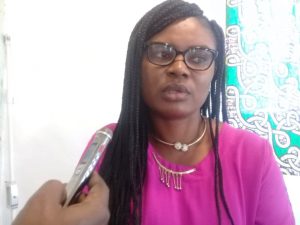
Monrovia – Since the recent increase in calls for the establishment of a war and economic crimes court, many victims of Liberia’s 14-year brutal civil war are speaking out about their painful ordeals at the hands of warring factions. They are also joining call and urging major state actors to push for the establishment of the court.
This story first appeared on FrontPageAfricaOnline as part of a collaboration for the West Africa Justice Reporting Project.
One of such victims is Ms. Danieletta Sleyon, executive director, Foundation for Human Rights and Democracy. Ms. Sleyon’s father, Joseph D. Sleyon, was slaughtered by one of the warring factions on September 16, 1994.
Danieletta is not only a victim but also one of the leading local players advocating for the establishment of a war and economic crimes court in Liberia and the implementation of the recommendations of the Truth and Reconciliation Commission (TRC).
“I am also a victim, because my father, an innocent man, was slaughtered and chopped into pieces. Dogs were allowed to eat his remains. It was difficult to gather all the pieces together for burial,” she narrated recently at a press conference in Monrovia.
She and other actors for the establishment of the court, including human rights lawyer Tiawon Gongloe, Hassan Bility, Director Global Justice and Research Project, (GJRP) and Adama Dempster, Secretary of the Civil Society Platform, had gathered to push for the establishment of the court and the implementation of the TRC recommendations.
Sleyon is one of many victims whose relatives and loved ones were among the estimated 250,000 people killed during the country’s civil unrest, throughout the 1990s and early 2000s.
She wants justice for the death of her late father.
“I was not present when my father was killed, but according to eye witnesses, he was killed by one of the rebel groups. As a result there were challenges I faced while growing up as a child without a father. So, I am advocating for a war and economic crimes court in Liberia, because my father’s soul and the souls of all those who were murdered are crying for justice. Justice is all we need to fight for right now.”
Ms. Sleyon urged fellow victims to serve as ambassadors selling the idea of the court to Liberians and how it will strengthen the country’s rule of law and provide justice for all.
Contrary to opponents against the timing of the court being setup in the country, Ms. Sleyon said that it is never too late for a perpetrator to account for crimes he or she committed.
She stated that there are many victims out there who are afraid to speak out now but the court when established, will allow victims to come forth to testify against those who committed some of the heinous crimes against humanity.
“I want to say to Liberians that the establishment of a war crimes court is a must. It is not just one group that is affected but the entire Liberian society,” Ms. Sleyon emphasized.
Also speaking, Cllr. Tiawon Gongloe told the conference that those who commit war crimes are cowards. He said they cannot follow normal rules, and they act when laws are weak, and in time of peace, laws are strong.
“The only way we can live peacefully, is to exclude war criminals from among us so that this place can be peaceful. There is no way this place can be peaceful when they are among us,” Gongloe said.
He protested that those responsible for some of the worst crimes against humanity should not live among us and hold top positions.
He added: “Because we will always remember whenever we see them. We have to hold them accountable, so they either should be in hiding or in jail.”
According to this rights lawyer, now is the right time for a court as some of the perpetrators are old and may die soon. “Their victims are also getting old and may also die soon. With very little documentary evidence available so many years later, witnesses’ testimonies will most often be the only evidence available to a court.”
Hasan Bility, one of main advocates, urged Liberians to decide if they want perpetrators prosecuted overseas or Liberia. Though Bility’s works have been critical for the cases filed against seven Liberians in the diaspora, he said it would be better to have warlords prosecuted in Liberia in the presence of their victims.
“It is never too late, because if you have politicians in the past who were abusing and murdering people now in decision making, the time is right,” said Bility.
He welcomed rumors that warlords are now becoming nervous about prospect of the court being setup in the country.
“Now the fear has shifted from the victims to the perpetrators so in my view, they create situation of doubt for the success of the establishment of a future war crimes court.”
As for Adama Dempster, he called on the Liberian Government to put together a resourced body, comprising government representatives, the National Independent Commission on Human Rights and civil society organizations to monitor the implementation of the TRC recommendations.
“We asked the government to remove persons who have been involved in gross human rights violations and war crimes from official positions, but that has not happened. So now is the time to mount pressure on the government because time is running out, or we might not have evidence when victims die.”
